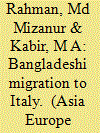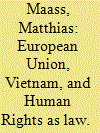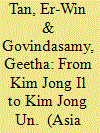|
|
|
Sort Order |
|
|
|
Items / Page
|
|
|
|
|
|
|
| Srl | Item |
| 1 |
ID:
116677


|
|
|
|
|
| Publication |
2012.
|
| Summary/Abstract |
Reformation of immigration policy in Italy has paved the way for the emergence of some non-European emigrant communities in Italy including Bangladeshi community. This study addresses the Bangladeshi migration to Italy by highlighting context of immigrant reception in Italy, characteristics of Bangladeshi emigrants, their channels of migration, role of intermediaries in the migration process, economic cost of migration and inflows of remittances and its implications on family dynamics. This study draws from the Bangladesh Household Remittance Survey conducted by the International Organization for Migration-Dhaka in 2009. The study reports that opportunities in the Italian labour market translate into the increased opportunities for migrant families left behind in Bangladesh.
|
|
|
|
|
|
|
|
|
|
|
|
|
|
|
|
| 2 |
ID:
116678


|
|
|
|
|
| Publication |
2012.
|
| Summary/Abstract |
Despite the significant level of cultural diversity that exists in contemporary Europe as a consequence of immigration and diaspora, state policies on multiculturalism in several countries have not kept pace with the complex and dynamic processes created by these pluralising social forces and realities. This has given rise to exclusionary contexts that have led to feelings of alienation by immigrant communities. In Britain, the violent street confrontations in Bradford in 2001 and the London bombings of 2005 both epitomised, as well as were outcomes of, the British nation state's failure to foster dialogue and a sense of inclusion among these communities. Foregrounding the extent of the grievances and frustrations prevalent in British society, these social disturbances have also contributed to renewed debates on issues of national identity, belonging, and multiculturalism. More importantly, these clashes, involving mostly the second-generation British Asian Muslim community, have brought to the fore the dissonance between assumptions of belonging underlying "state multiculturalism", which moves to fix and stabilise identities, and those that inform the complex processes of identification and constructions of the "third space" of belonging by racialised minority communities. Focusing on Britain, this paper's central hypothesis is that official multiculturalism has failed to take into account the fluid and heterogeneous frames in and through which second-generation British Asians ground their cultural and political identities and demands. As many of the nation states in Europe are today, like Britain, multiethnic in composition with expanding Asian communities, how successfully or not Britain modifies its integration policies with respect to the presence of minorities of immigrant origin has enormous implications not only for Europe but also for Asia and Asia-Europe relations.
|
|
|
|
|
|
|
|
|
|
|
|
|
|
|
|
| 3 |
ID:
116675


|
|
|
|
|
| Publication |
2012.
|
| Summary/Abstract |
The year 1995 marked a major watershed for modern Vietnam. It completed its post-Cold War strategy of "multilateralizing" its foreign policy by joining ASEAN, normalizing relations with the US, and signing a comprehensive framework agreement with the EU. All three are recognized as major accomplishments for modern Vietnamese diplomacy. However, in the EU-Vietnam framework agreement, Hanoi made an unprecedented concession when it agreed to the human rights clause in the treaty. For the very first time, Vietnam had accepted an explicit, legally binding stipulation on human rights in a bilateral treaty. This remarkable development resulted from the confluence of three major dynamics. First, Hanoi had committed itself to establish sound relations with all major economic centers-of-gravity at the time, ASEAN, the US, and the EU. Second, the EU also was keenly interested in stronger relations with Asian countries but was flexible about prioritizing any particular bilateral relationship. Third, Brussels' diplomats had to work off a treaty template when negotiating fundamental bilateral agreements. The standard EU framework agreement at the time included a human rights clause. In 1995, the EU was insisting that any treaty with Vietnam would have to include a clause on human rights. Initially, Hanoi rejected such a treaty provision, and the negotiations stalled. However, when Hanoi realized that Brussels felt no urgency to complete the treaty and was unable to compromise on human rights, Vietnam's leadership reconsidered. In order to complete the strategy of "multilateralizing" its international affairs, Vietnam had to accept the human rights clause in the treaty with the EU.
|
|
|
|
|
|
|
|
|
|
|
|
|
|
|
|
| 4 |
ID:
116680


|
|
|
|
|
| Publication |
2012.
|
| Summary/Abstract |
The recent death of Kim Jong Il and the succession of his son, Kim Jong Un, as Supreme Leader of the Democratic People's Republic of Korea leaves the Northeast Asian region at a crossroads. Given the younger Kim's lack of political experience, it is reasonable to believe that his priority will be on consolidation of his political and military power base in Pyongyang. More recently, the Democratic People's Republic of Korea (DPRK) has sent mixed signals with regard to its intentions. On the one hand, North Korea has agreed to a moratorium of its nuclear activities and has even invited the IAEA to inspect its nuclear facilities; at the same time, however, the DPRK has also announced its plan to launch a satellite in mid-April, using technology derived from the Taepodong missile. Set against this backdrop, we underline and comparatively assess the importance of the USA, the Republic of Korea, and China, all of which will be going through a political transition in 2012. We conclude that Seoul and Beijing are in the best position to reopen the process of dialogue with the DPRK.
|
|
|
|
|
|
|
|
|
|
|
|
|
|
|
|
| 5 |
ID:
116679


|
|
|
|
|
| Publication |
2012.
|
| Summary/Abstract |
This paper deals with Korea's peacekeeping operations (PKO) activities that are important to assess its middle power activism. The numbers of Korean PKO troops lessened drastically during the period 2003-2007. The purpose of this paper's analysis is to discover the determinants of this drastic change. For the analysis, economic growth and state budgets are classified as economic factors, while partisanship and political leadership are classified as political factors. The analysis led to the following conclusion. Regarding economic factors, the economic growth and the state and defense budget stay relatively constant and do not match the fluctuation of the PKO activities in Korea. Regarding political factors, there is no correspondence between partisanship and the PKO policy, because the liberal governments of Kim Dae Jung and Roh Moo Hyun implemented different PKO policies. The political leadership factor appears to be rather significant. Both Kim Dae Jung and Lee Myung Bak eagerly seek international cooperation. In contrast, Roh Moo Hyun emphasizes self-reliance. Thus, we conclude that the political leadership factor is most likely to influence the fluctuation of PKO activities in Korea.
|
|
|
|
|
|
|
|
|
|
|
|
|
|
|
|
| 6 |
ID:
116681


|
|
|
|
|
| Publication |
2012.
|
| Summary/Abstract |
This study investigated the link between press and democratic consolidation in Turkey. It was assumed that plural structures in the sense of diversity of the news, approaches, responses, and ideological positions would be contributive to democratic consolidation. Accordingly, this article searched the patterns of diversity and plurality among the print media news between the years of 1984 and 2008. The article proved that the Turkish press responded in a plural manner to the selected case.
|
|
|
|
|
|
|
|
|
|
|
|
|
|
|
|
| 7 |
ID:
116676


|
|
|
|
|
| Publication |
2012.
|
| Summary/Abstract |
Globalization has led to new health challenges for the twenty-first century. These new health challenges have transnational implications and involve a large range of actors and stakeholders. National governments no longer hold the sole responsibility for the health of their people. These changes in health trends have led to the rise of global health governance as a theoretical notion for health policy making. The Southeast Asian region is particularly prone to public health threats such as emerging infectious diseases and faces future health challenges including those of noncommunicable diseases. This study looks at the potential of the Association of Southeast Asian Nations (ASEAN) as a regional organization to lead a regional dynamic for health cooperation in order to overcome these challenges. Through a comparative study with the regional mechanisms of the European Union (EU) for health cooperation, we look at how ASEAN could maximize its potential as a global health actor. Our study is based on primary research and semistructured field interviews. To illustrate our arguments, we refer to the extent of regional cooperation for health in ASEAN and the EU for (re)emerging infectious disease control and for tobacco control. We argue that regional institutions and a network of civil society organizations are crucial in relaying global initiatives, and ensuring the effective implementation of global guidelines at the national level. ASEAN's role as a regional body for health governance will depend both on greater horizontal and vertical integration through enhanced regional mechanisms and a wider matrix of cooperation.
|
|
|
|
|
|
|
|
|
|
|
|
|
|
|
|
|
|
|
|
|